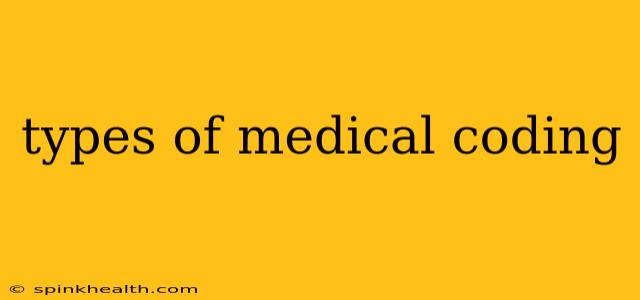Decoding the World of Medical Coding: A Journey Through the Different Types
The world of healthcare might seem complex, but at its heart lies a system of precise communication: medical coding. Think of it as the language healthcare professionals use to talk to insurance companies, researchers, and each other. Without accurate coding, the entire healthcare system would grind to a halt. But what exactly is medical coding, and what are its different types? Let's embark on a journey to explore this fascinating field.
Imagine a bustling hospital, where doctors diagnose, nurses administer care, and therapists provide rehabilitation. Each interaction, each procedure, each diagnosis needs to be translated into a standardized code. That's where medical coders come in – they're the linguistic translators of the healthcare world.
What are the Main Types of Medical Coding?
While there are nuances and specializations within medical coding, the main types revolve around the coding systems used:
1. ICD Codes (International Classification of Diseases): These codes are the backbone of diagnostic coding. They categorize diseases, injuries, and other health conditions. Think of them as the "why" behind a patient's visit. For example, a patient with pneumonia would receive an ICD code specific to that condition. Currently, we're using ICD-10-CM (Clinical Modification) in the United States, a highly detailed system with thousands of codes allowing for precise diagnosis classification.
2. CPT Codes (Current Procedural Terminology): These codes describe the "what" – the medical procedures and services provided. From a simple office visit to a complex surgical procedure, each action has a corresponding CPT code. These codes are crucial for determining reimbursement from insurance companies. A coder might assign CPT codes for a physical examination, a blood test, or a surgical operation.
3. HCPCS Codes (Healthcare Common Procedure Coding System): This system expands on CPT codes, including codes for supplies, equipment, and services not found in CPT. Think of it as the "extras" – the supplies used during a procedure, or the specific type of equipment employed. HCPCS Level II codes are particularly useful for capturing the wide array of supplies and services used in modern medicine.
Frequently Asked Questions (PAA Inspired)
What is the difference between ICD and CPT codes?
The key difference lies in their function. ICD codes classify diagnoses, while CPT codes identify procedures and services. They work together to provide a complete picture of a patient's encounter with the healthcare system. Imagine it like this: the ICD code explains why the patient is there (the diagnosis), while the CPT code explains what was done (the procedure).
Which coding system is used most often?
Both ICD and CPT codes are essential and frequently used. Almost every medical claim requires both diagnostic (ICD) and procedural (CPT) codes to ensure accurate billing and reimbursement. Without both, insurance companies wouldn't have a complete understanding of the medical necessity of the services provided.
How do I become a medical coder?
Becoming a certified medical coder generally involves completing a formal education program, either through a vocational school, community college, or online program. Afterward, you'll need to pass a certification exam, such as the Certified Professional Coder (CPC) exam offered by the American Academy of Professional Coders (AAPC). Continuous education is vital to stay updated with the constantly evolving coding systems and regulations.
Are there different specializations within medical coding?
Absolutely! While general medical coding covers a broad range of specialties, many coders specialize in specific areas like cardiology, oncology, or radiology. Specialization allows coders to develop expertise in the specific terminology and procedures within a given field, ensuring greater accuracy and efficiency in coding.
What is the future of medical coding?
With the increasing adoption of electronic health records (EHRs) and the continuous evolution of healthcare technology, the future of medical coding involves greater integration with these systems. Artificial intelligence and machine learning are also beginning to play a role, potentially automating certain coding tasks while enhancing accuracy and efficiency. However, the fundamental need for skilled and knowledgeable medical coders will remain crucial to the healthcare industry.
Medical coding is a vital and often overlooked part of the healthcare system. It’s a field that requires attention to detail, a strong understanding of medical terminology, and a dedication to accuracy. This intricate system ensures efficient communication and accurate billing, contributing significantly to the smooth functioning of the healthcare industry as a whole.

